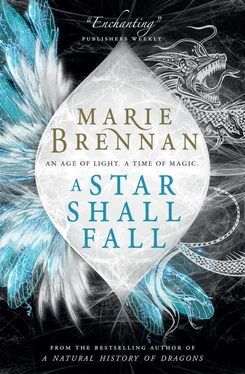But there was no replacement waiting for Galen. Amadea had spent the past eleven days assembling a list; there were possibilities. None were gentlemen. Lune would choose from among them after this was done—if there was still an Onyx Hall left.
Galen surrendered to Lune the London Sword, the central piece of their royal regalia. She released him from his obligations as Prince, with many fine phrases. All of it was for show. Many of the watching fae knew by now about the London Stone, if not where its faerie side lay; they knew the true release would come in that hidden chamber, where Lune had once bound Galen to the keystone of their realm. Even Michael Deven had never renounced that bond. But this ceremony served its own purpose, because the enchantments of the Hall were not the only things that needed to bid the Prince farewell.
Lune faced her court and spoke, pitching her voice so it carried to the far corners of the chamber, and up into the crystal panes high above. “Once the sun sets, we will be redeemed from the threat that has haunted us since the days of Charles II. Galen St. Clair, though Prince no more, will render unto us the greatest gift any man can bestow. He will lay down his life, binding the spirit of fire to his own mortality, and in doing so will destroy it. Remember this. Remember him. Let the Onyx Hall honour his sacrifice, until the last stone falls, and the last faerie departs from England’s shores.”
The wave spread outward from the dais, fae kneeling upon the cold marble. Perfect silence followed in their wake, as if all the court held its breath. Then footsteps: uneven, two no longer walking as one. Hand in hand, Galen and the Queen descended and crossed the chamber, going out through the great bronze portal, which shut behind them with a sound like the closing of a mausoleum door.
THE MONUMENT, LONDON
30 April 1759
The sun died a bloody death on the eastern horizon, staining the last remaining shreds of cloud with crimson light. London still bustled with evening activity, carters and porters and housewives exchanging familiar curses, but it was distant and muffled. Magic as strong as that used to hide the Moor Fields for Midsummer cloaked this little yard, clearing it for the use of the fae.
The Monument to the Great Fire of London dominated the space, its squat, square base ringed about with carving. Three sides bore Latin inscriptions; the fourth bore an elaborate allegory of the City’s destruction. Irrith had paced past it six times already, and hated the work more with each turn. That stiff image did not begin to describe the infernal horror of those days.
But it was easier to look at the carvings than the pillar above. The Monument soared two hundred and two feet into the darkening air, an enormous, isolated column, crowned with an urn of gilt-bronze flames. Tiny shadows moved up there: the von das Tickens, placing the lenses and mirrors Schuyler had made for this purpose. The comet, they said, haunted the southern horizon, beneath the constellation of Hydra, just on the edge of twilight. Once they arranged their equipment and opened the hatch in the urn, they would banish the few remaining clouds; and then someone would be able to look up from the bottom chamber and see the comet.
Galen would be able to look. Irrith’s gut twisted into a knot.
The spear-knights waited on the paving stones of the Monument Yard, armed and armored and protected by the tithe. Bonecruncher led a troop of goblins in support. They, like Irrith, carried guns loaded with iron shot, and knives made from leftover slivers of the jotun ice. The rest of the Onyx Guard were stationed at the entrances to the palace, in case all failed, and the beast escaped them. If Galen’s own mortality didn’t kill the Dragon, they would.
They hoped.
Irrith halted near the door into the Monument, because there was movement at the edge of the yard. The procession was a small one: just Lune, Sir Peregrin Thorne, his half-human son Edward, and Galen. No Delphia St. Clair. Irrith didn’t blame her for not coming to watch her husband die.
Galen wore only a shirt and knee breeches, stockings and shoes; no coat, no waistcoat, no wig. In the light of the lantern Edward held, the chestnut tint of his hair was stronger than ever. Irrith stared as if she would memorise it, to be recalled a century from now, and then she closed her eyes in stark refusal. No. Let it go.
The light dimmed. She opened her eyes to see Edward extinguishing the lantern, and the knights and goblins saluting. Belatedly, she did the same. Lune pressed her lips to Galen’s brow. Only that; no final words. Perhaps she’d said them below, when they were alone in the chamber of the London Stone. Or perhaps there was nothing she could say.
The former Prince hesitated. For a moment, Irrith thought he was about to speak; then she thought he was about to refuse. She froze, torn between terror and hope.
Galen spun without warning and strode toward the Monument. The others were standing a little distance away, and so they were behind him; Irrith, waiting near the door, saw his face.
Fear. The white line of his lips, the desperate set of his jaw, the tendons rising sharply from the open collar of his shirt. What Galen hid from the others, Irrith saw: the terror of a man walking to his death.
Tears obliterated her vision, and then he was gone.
* * *
He’d walked the path a thousand times in his mind.
Through the door, into the cramped space beyond. To his left, one set of stairs: barely wide enough for two people to pass, leading upward to the viewing platform and the urn of flames. To his right, a second set: rougher and narrower, leading downward into darkness.
He took the second path.
A dozen steps, then a sharp turn, then five more. Galen descended carefully; they dared send no faerie light with him, and he hadn’t thought to ask for a candle. The chamber at the bottom was stiflingly close, almost small enough to span with his arms. The ceiling curved into a shallow dome, with a round opening in the centre. By the faint light filtering in from above, Galen positioned himself beneath the opening, and looked upward.
The sun-gold sheathing the walls, marked with alchemical symbols, was invisible in the gloom. Through the opening, though, he could see the stairs, curving around and around, more than three hundred steps in total. The hatch at the top, concealed within the urn, was still closed. But soon enough the von das Tickens would open it, and then he would look through the lenses and mirrors to the comet whose return Halley had predicted more than fifty years ago.
He would see the Dragon, and the Dragon would see him.
The warmth of the sun-gold did not touch the coldness inside. Abd ar-Rashid had prepared him inside the Calendar Room: congelation, distillation, fermentation, conjunction, separation, dissolution. Alchemical processes, their order reversed, while Galen purged all things of fire from his body and spirit. There was no anger in him, no desire for action; he was an empty vessel, awaiting the annihilating light.
But fear was not a thing of fire. And so the fear remained.
Three hundred steps and more, a spiral path to Heaven. Galen stood in the darkness below. It was fitting, really. Irrith’s words had cut deeply because they were true. All of this had come about because he loved Lune. Because of her, he returned to London, following his heart instead of his duty to his family. Because of her, he searched the city high and low until he found a door to her hidden realm. He accepted the title of Prince, which he never deserved to bear; he betrayed the loyalty he owed to Delphia, in spirit if not in deed. None of it was righteous. And now he sought his own death.
Читать дальше












